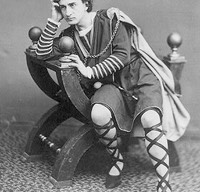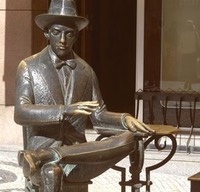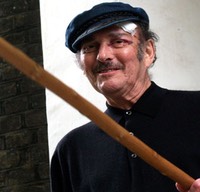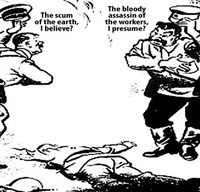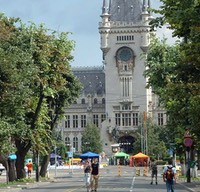Under Ceausescu
The Casa Universitarilor
By Vivid writer: Christopher Lawson
Christopher Lawson remembers the academic regulars, from the highly distinguished to the utterly disreputable, at the Iasi university restaurant club in the mid-1970s
Posted: 04/10/2008
Now privately owned, these days it's just another unremarkable restaurant in Iasi, open to all and sundry. A beer garden opens in the spring and summer months. The wedding receptions every weekend are grander affairs than in the more austere 1970s. Amplified music deafens the guests and can be heard halfway down the street. I remember my acute embarrassment when I was invited to a wedding dinner in the old days. With the American lecturer - who should have warned me - we were among the best-paid participants. All the other guests gave sums of money to the happy couple. I didn't because I didn't know the custom.
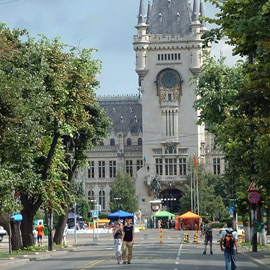
A street in modern Iasi
Those who wait tables today are young, male, brash and a little slapdash. They show you every minute that they are paid the salar minimum de pe economie (Eng: minimum wage.) To be quite honest, the level of service is abysmal. In the old days the middle-aged and motherly waitresses offered more attentive service and called you domnul profesor (Eng: Professor.) In the mid-1980s when austerity became near-starvation, the bar staff fronted a useful operation which provided meat and salami to the families of regular customers.
The clientele has changed radically. In the 1970s the Casa Universitarilor was an exclusive club for university staff. Everyone in the academic world from retired professors to the most junior assistants came to dine here. Young doctors from the university hospital dropped by. Directors and actors from the National Theatre, all speaking immaculate French, had their own table.
One day it stood empty and remained unoccupied for the next few days. I asked a colleague what had happened to this witty, civilised bunch. "They are all in prison for immoral behaviour," she replied, a touch of puritanical smugness in her voice. In Orthodox Romania, the communist system found homosexuality just as difficult to deal with as the post-communists.
Mamaliga was a staple of the appetisers. Somewhat to my surprise, Maurice Toussaint, the French lecturer, loved it. "It travels down your gullet and lands in your stomach with a huge thump. You don't feel hungry for the rest of the day," he opined, while holding forth on some obscure aspect of theoretical linguistics which, apart from him, about six people in the world could understand.
About half the menu was available. You could normally rely on frigarui (Eng: shish-kebab), creier pane (Eng: fried brain), pork chops, and even Chateaubriand, with tomato and cucumber salad or muraturi (Eng: pickled vegetables) on the side. Clatite (Eng: pancakes with jam or chocolate) was the only dessert on offer.
There were microphones in the ashtray stands of course, but colleagues would come and sit with me without demur. "The President has decreed that everyone should be addressed as tovaras (Eng: comrade), not domnul (Eng: Mr.). But he didn't specify what foreign lecturers should be called. So what would you prefer: Domnul tovaras profesor or Tovaras domnul profesor? Or would you prefer to stick to the bourgeois form?"
A weathered teacher from the Department of Romanian as a Foreign Language whom I met in the Casa gave me an expert tour of the Cathedral of the Three Hierarchs. He had acquired his fluent German in a Siberian prisoner-of-war camp after Stalingrad. Rarely would foreign visitors appear. The Berliner Ensemble, one of the greatest theatre troupes in Europe, founded by Bertolt Brecht, put on two memorable performances. In Puntila and his Hired Man Matti, a knockabout comedy about class warfare, bursting with verbal polytechnics, the landlord, Puntilla, is friendly, garrulous and a man of the people, when drunk, but heartless, cynical and penny-pinching when "attacked by sobriety". His faithful chauffeur bears the brunt of his wrath and struggles to keep him inebriated. The highlight for the audience, which apparently included the entire Jewish population of Iasi, was a scene in which Puntila takes a shower on stage, probably to sober up.
The second offering was Gorki's Mother, a model for the "proletarian literature" and socialist realism espoused by the Bolsheviks. The love of the devout Nilovna for her son and the force of his ideas convinces her to support the revolutionary cause. She is beaten to death by police while attempting to smuggle him copies of her son's defence speech. As the play was pure agitprop, with depersonalised, formulaic characters, audience reaction was polite rather than warm.
I met the director sipping Israeli brandy in the Casa. While an exchange student in West Germany, I had actually attended two performances of the Ensemble at the Schiffbauerdamm in 1962, a year after the Wall went up. I had seen Mutter Courage, the nickname of a canteen woman with the Swedish army, haul her cart through 12 of the Thirty Years' War, Europe's bloodiest conflagration before the First World War. Anna Fierling continues to do business with the troops while all three of her children are killed. I had watched The Resistible Rise of Arturo Ui, a parable of Hitler's rise to power set in gangster-controlled 1930s Chicago. Neither experience had ever left me.
With my theatre-fan credentials established, we got on very well. He even invited me to call on him next time I came to Berlin. The following year I took up his offer. After crossing the border at Friedrichstrasse, I found myself sitting in the front row, an honoured guest, at a performance of Brecht's uncollected sketches and short plays, surrounded by the well-scrubbed faces and pressed uniforms of the Free German Youth. Some time in the 1980s, the director defected, of course.
Another foreigner I saw again after an encounter in the Casa was the wealthy and well-preserved wife of the literary editor of the Chicago Tribune. Romania bored her. She particularly disliked the female minder-interpreter who accompanied the couple. This lady operative complained endlessly about the classic Westerns which were the principal fare of Romanian TV at the time.
To the students of the English Department, the critic, an avuncular Carpathian bear of a man, had given a magisterial survey of the state of the American novel which his wife had doubtless heard a hundred times before. She showed more interest when I said I'd be in London that summer.
Probably against my better judgment, we arranged to meet. I found her in the foyer of one of the plushest hotels in Mayfair. Over dinner she mostly complained about her husband. Alarm bells rang. I was uncomfortable. At least 20 years my senior, she invited me very directly to stay the night in her luxurious bedroom. Was the lady a fully paid-up nymphomaniac or just lonely? Playing the polite English gentleman to the hilt, I rebuffed her advances. She wasn't my type at all. She was furious. I couldn't really tell her that I was staying with my Mum and Dad, who would worry unduly if I did not reappear that evening.
But my favourite denizen of the Casa was a home-grown Romanian. Experienced topers from the university community occupied the room on the left of the Casa, known as the Left Bank. It was the preserve, especially late on Sunday mornings, of those of pensionable age, many in their 70s, some in their 80s. Among them, nobody offered more entertainment value than Professor Stefan Cuciureanu, Head of the Italian Department, the thirstiest man in Iasi. Provided he was well-supplied with bottles of wine to quench his inexhaustible craving, he would discourse learnedly and amusingly in French, Italian and Romanian on any literary or linguistic subject within his expertise, from Dante Alighieri to Gabriele d'Annunzio, from Luigi Pirandello to Italo Svevo, on Vulgar and Medieval Latin, and the many bonds which united Romania and Italy.
He had done his postgraduate studies in Mussolini's Italy. With the installation of communism, his master's degree in linguistics was briefly considered fascist and inadmissible in the socialist republic. But Cuciureanu was far more interested in wine than politics. The Securitate left him alone, although his outrageous public behaviour was deeply subversive of the communist system and its outward respectability.
One evening I showed my judgment had improved not one whit by inviting him and a couple of companions to visit my fourth-floor apartment. Already well-oiled, he fell asleep in my only armchair, peed down his trouser leg and wet the government-issue carpet. On regaining consciousness, he proffered me his empty glass, and resumed his previous topic. We had to half-carry him down to the entrance - the lift was broken, of course - and pour him into a taxi. When I next met him a few days later, it was as if nothing untoward had ever happened.
This legendary figure is still talked about fondly. His academic contributions and riotous lifestyle were recently the subject of a paper by a colleague at a conference on 70 years of Italian Studies in Romania. He managed to make three visits to his beloved Italy during the communist era and died, well-pickled, in his 80s, a testimonial to the life-giving properties of vin de casa.
I remember him affectionately. Unlike many inveterate boozers, he was never boring. Well, almost never. These lines are as much a tribute to a colourful tippler and linguist as they are to a place and an era in which the vapours of good wine and good company helped to stifle and drown, for a few hours, the endless adulation of the Conducator in the party newspaper, Scinteia, and on television, where a fawning court poet presided almost every Saturday night over mass propaganda rallies with special light effects.
